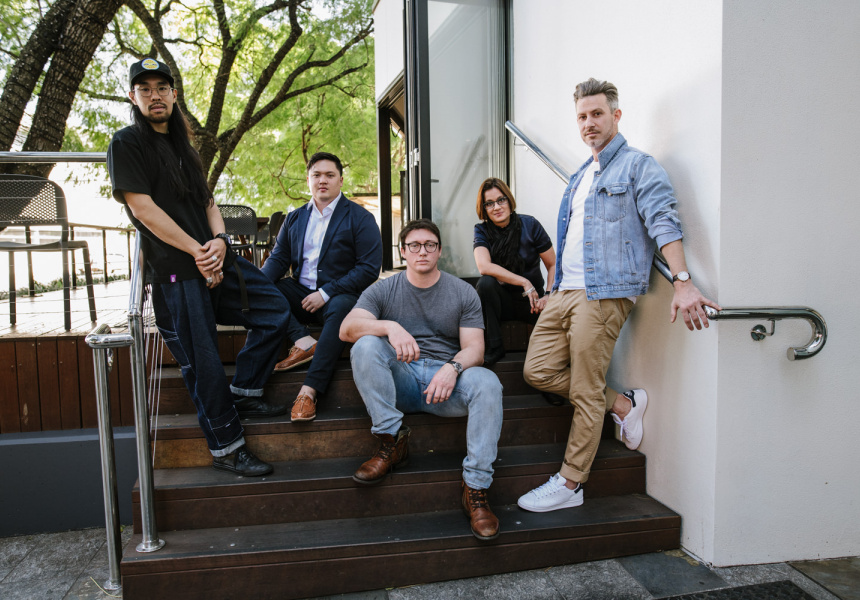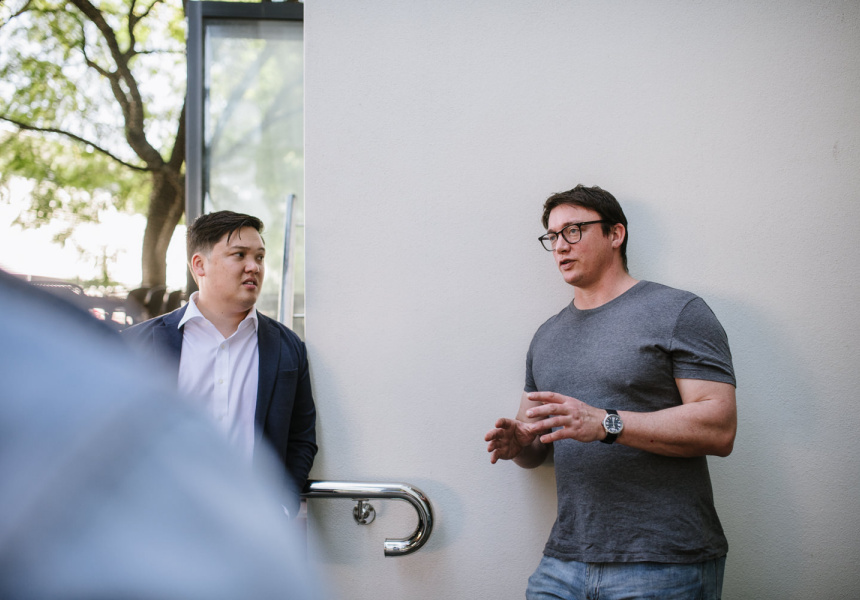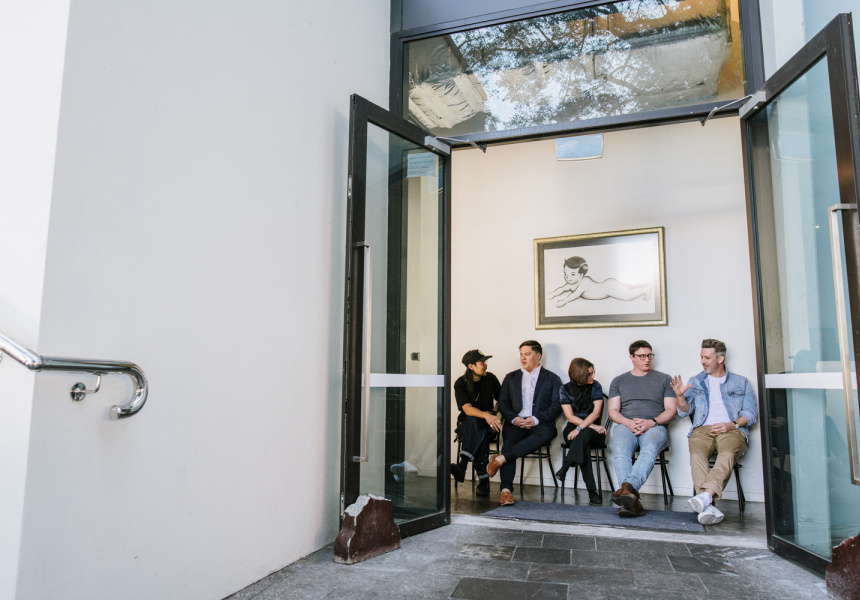A massacre. That’s how one restaurateur described his fears for Brisbane’s dining scene during an off-the-record discussion with Broadsheet earlier this year.
It’s fair to say 2018 hasn’t been pretty at times. It started with the shuttering of NKB Group’s Burnt Ends and Nativo. The demise of Burnett Lane favourite The Survey Co followed soon after. More recently, there was Ryan Squires’s decision to wind down his critically successful Esquire and Esq restaurants, and then Margo in Paddington closed.
Just last week came the unexpected closure of Mary Randles’s Madame Rouge, too. Randles told Broadsheet the decision was brought on by the demands of husband Philip Johnson’s recently relocated E’cco restaurant. But she also said that, while Madame Rouge was covering its outgoings, no one lets go of a venue that is “making loads of money”.
Never miss a Brisbane moment. Make sure you're subscribed to our newsletter today.
SUBSCRIBE NOWAt the same time, the march of new venues hardly seems to have let up. Walter’s Steakhouse, Spice Den, Superfly Funk Eye, Three Blue Ducks, Casa Cibo and Stavros the Greek have all opened. And all are at the very least able restaurants capable of producing a great experience.
This is taking place against the background of a monumental period of growth in Brisbane, with new apartment precincts, retail hubs and developments cropping up all over town. Baked into every new high-rise that shoots up in Newstead or the Valley or Bowen Hills are commercial spaces designed for restaurants and cafes.
So what's going on? It’s an exciting time to be a diner in Brisbane. But are these acres of new restaurant and cafe space unleashing inexperienced operators on to the market and causing supply issues? And is 2018 turning out to be some sort of make-or-break year for Brisbane’s restaurant scene? Or is all this just part of the normal undulations of a city that’s changing before our eyes?
We wanted to know, so we asked some of our best operators:
“Is Brisbane’s restaurant industry headed for crisis in 2018?”
What we found was plenty of concern, but also a sense of positivity and optimism. Answers have been edited for clarity and brevity.
–
Cameron Votan – Happy Boy, Italian Food Restaurant and Greenglass
“I’m not sure if there’s a ‘crisis’ or any real structural issue. With any market things open and things close, we’re seeing a lot of openings and more competition leads to tougher conditions for everyone. I think it’s exciting – we’ve got openings happening that might not have happened any other time.
"For our restaurants things have basically been as we expected and stayed solid. Happy Boy and Greenglass have a great customer base. Maybe Italian Food Restaurant has suffered a bit. It definitely hasn’t kicked off as much as we thought. In a crowded marketplace the nuance of what we’re trying to do up there in Spring Hill might have gotten lost. It’s picking up now, but it didn’t have the kind of spike we hoped for when you open a new restaurant. I wouldn’t be rushing to open anything new right now. We’re focussing in on our core and making that really strong.
"There’s a more relaxed and casual feeling in Brisbane. Our lifestyle’s more casual, and I think as restaurateurs we need to embrace that. For us it’s all about the food and the wine and nothing beyond that. I wouldn’t want to be in Sydney or Melbourne where there’s a higher level or pretentiousness – Brisbane consumers are adventurous but they won’t be happy if you don’t give them value.”
Siarah Webb – Enzo & Sons
“From my perspective there are too many places opening and not enough people going out – on weekdays, anyway. And there’s all these developments offering big incentives for people to open restaurants and not thinking about other people around them or the long term. People are lured in by the incentives, the help with the fit-out costs, but then they have to pay that all back. Then there are the rents, which just aren’t sustainable in the economy. Landlords need to come to the party and offer more reasonable rent plans.
“The other issues with too many places opening is it causes this labour drain. There are not enough good chefs or good managers to go around, and that affects the end product. I’d also say delivery services are destroying a lot of places. They take too much of a cut, and it discourages people from going out and socialising. If people want Brisbane to feel like a real city, they’ve got to start going out during the week.
“If you want to achieve a nice, individual restaurant the costs are just too high for what people want to pay. And that’s why the fine-dining scene in Brisbane is really dying. Even big corporates don’t have the spending power to take the whole office out to an extravagant lunch and stuff like that as they did when the mining boom was on. That’s all different now.”
Damon Amos – Detour
“It’s a very exciting time – I moved in Brisbane in 2002 and the dining scene was nowhere near as vibrant as it is now. It’s great for diners to be able to broaden their palate. There are definitely advantages to being in Brisbane – it’s a beautiful city, and I’ve got outdoor dining in the middle of winter, which I just could not have in Melbourne.
“The city’s been really good for me. I’ve been breaking trends and rules and it’s working – I don’t know why. We’ve had very good customer word-of-mouth. That’s the best marketing you can get and you can’t buy it. There are plenty of factors in what might make a restaurant successful, like we’ve got good parking, we’re a bit out of the city, we treat our customers really well – all that adds up. But I’ve been really lucky because I had an idea of what I wanted to do and it worked straight away. But if we’d opened and it’d been like, ‘Oh, this isn’t working’ and we’d had to change a bunch of things, it might have gotten confused and difficult.
“I think there’s something to like about every single restaurant, really – someone’s going to like something about everywhere that’s opening, and not everyone’s super critical. I just think it’s a good time for customers, they have a much more exciting and diverse dining experience than they’ve ever had before.”
Dane Huitfeldt – Hai Hai, Superfly Funk Eye, Remy’s, Special Rub and King Tea
“There are not too many new challenges, I think, that are specific to Brisbane. Though I imagine there’s a lot of people in general up in arms about wage increases and stuff like that and there does seem to be a bit of a glut of new openings in Brisbane. I’m a big advocate for saying there’s simply not enough people in Brisbane, and if we had more people that’d solve a lot of problems for restaurants especially. In a lot of ways I think the competition is a positive thing – it should be forcing people to do a better job. For people who continue to evolve and look at what’s going on in the market and already have a good customer base it shouldn’t be much of an issue.
“The most common things I hear from chefs is, ‘Don’t bother opening in Brisbane, go to Sydney or Melbourne.’ And that’s just from them wanting to do super progressive stuff. I’ve been hearing that for years, people just wanting the market to be something that it’s not. I don’t think people should be scared of doing things that are new, I think they should be scared of doing things half-arsed and not doing their research. If you ignore the market and just do what you want to do it’s always going to be a risk.
“As a punter I think all the new openings are great because there’s always something new to do, but they’re not necessarily places you’d come back to a second time. And there are all these new operators who are full of beans and they’re getting huge incentives to open up and have a go, but if you don’t have the experience to follow it up you’re going to have a tough time.”
Ryan Squires – formerly Esquire and Esq
“Brisbane is such a great town but seems to be tripping over itself – it hasn’t really matured. You’ll see a restaurant where there’s a line-up, people waiting 45 minutes, then two hundred metres down the road you’ll have empty restaurants. And it’s not about that restaurant being particularly phenomenal; it just says a lot about how powerfully people’s perceptions are affected by social media.
“I feel that some critics and the media are very happy with mediocre. I read an article in the paper that was like, ‘Brisbane’s ten best fish-and-chip shops’, and seven of them were mediocre. If you can’t think of ten, think of three and inspire the other seven to work harder. We need less restaurants and those remaining need to be higher quality.
“When I was a young apprentice all I wanted to do was work for the world’s best. The whole time I was thinking you’re doing the right thing, you’re working hard. But sometimes I think I should have gone to work for someone who does really good burgers, or who had some kind of good casual restaurant instead of these world’s best restaurants. Maybe that would have prepared me better for Brisbane.”
Tom Sanceau – Coppa Spuntino and Red Hook
“We’re at a challenging point. Brisbane’s like an adolescent at the moment and we’re having growing pains. We’re trying to turn into this new world city and it’s happening, but when you compare Brisbane with other cities we’ve got too many venues and not enough population. In saying that, we get about 1000 people move here from the southern cities every week, so we’re catching up – it’s just a bit out of balance at the moment. These new hot spots keep popping up, and because we don’t have that huge population you do notice less people in the city. A lot of people are now going to Newstead, which has sucked a lot of people from The Valley, then when Howard Smith Wharves opens that’s gonna suck people out of the CBD as well.
"It’s interesting for me because, personally, in the last six months I’ve seen a downturn, but then recently diners have started coming back to me. It’s like they’ve tried these other places, but then they’re coming back to us. And that’s because of the high level of quality and service. Service is really important to me and something I try and teach all my staff. We’re a people industry at the end of the day. As a venue owner and a director, having had some highs and lows, for me when I have a business performing on a high level it’s because I’m there every day directing, motivating, being passionate, preaching. The high bar for me has always been Paolo [Biscaro] from Beccofino – he was there at the restaurant every service for the first six years motivating his staff, giving people that great experience. That’s what makes a place successful.”
Celine Damour – C’est Bon
“For me it’s a bit scary. We opened C’est Bon ten years ago, and we’ve seen so many closures that were unexpected, and so many openings – and you realise in all that there’s so much money lost and so many people losing their jobs. There are so many more restaurants in the city now compared to when we first started. And the market can be hard to pick – sometimes it seems people like to go out and sit down for a meal and take their time, then sometimes it seems to be about who’s selling a blue or red or yellow burger or something.
"I was absolutely shocked when Madame Rogue closed. It’s not even about being good anymore, that’s the thing that feels a little unfair.
"The one thing I’d say to customers is, if you like somewhere go back. Not every five years but a few times a year, because that’s the only way we survive. I’m French, and it’s a very European thing to go to the same place all the time if it’s good and you know you’ll enjoy it – if you live in a small village and there’s a good bakery you go to that bakery every day.
"I went to Melbourne a couple of months ago, and it was a Monday night and we couldn’t get a table at 9pm because everything was fully booked – it was fantastic.”
Ben Chiu – Ben’s Burgers
“It might not be a Brisbane specific thing. I hear all around that hospitality isn’t the easiest thing at the moment. From the perspective of Ben’s Burgers we’ve seen a massive shift on the way people eat, with the food delivery services coming in. We do a bit of volume through Uber but it’s also made us really change our business. Our dine-in trade is nowhere near as big as it used to be and I imagine that’s the case for a lot of people. Delivered food has taken a lot of smaller places out of the equation as destinations to eat out. We’re having to look into ways to entice people to come into the restaurant, doing specials and events that get people back in the restaurant. It’s about making it an experience.
“Businesses have to look over all aspects of their restaurant – the food, the environment, how your staff are trained. People can’t get away with certain areas not being that good anymore. There are definitely still restaurants where they’re getting heaps of people dining in – Happy Boy, Longtime, old-school places like Beccofino and Julius – they have no problem getting people through the door because they’ve carved out a great reputation and a great experience. It’s changed the dining landscape because restaurateurs need to be across everything.”
Massimo Speroni – Bacchus
“In a city growing as fast as Brisbane we see many new restaurants open, but this happens everywhere around the world. I think it’s a good thing – every restaurant and food business has to constantly improve and stay competitive. Fear of new openings is just part of business ownership, but controlling quality, costs and consistency are the real keys to keeping the business alive. Being relevant for a long time in a fickle market is an achievement.
"Most restaurants have to understand where the market is and try to ride the wave. It’s a different story for a Bacchus, which has its own style and idea of food and service and is trying to give Brisbane something different. We’re trying to change the Brisbane food market. We have a close relationship with diners who come back each month and that makes a huge difference.
“Too many adventurers are opening food business without experience and they are beaten by costs.
“The Brisbane food scene is not expensive. Actually, it is behind other cities and this makes our job more difficult. Brisbane’s customers have to start thinking about where they eat and what they eat. It is cheaper to keep an informal and casual restaurant alive, compared to a fine-dining place where you need at least three times more staff than usual. There are risks and it is challenging, but that’s also the beauty of our business.”
Mary Randles – E’cco and formerly Madame Rouge
“The Brisbane dining scene is evolving at a massive pace. I think people are dining out a lot more but seeking more casual, shared-food style dining. They’re moving away from the entrée-main-dessert format.
“There are restaurants opening all the time, and closing, but that’s just the nature of the business. People have a romantic idea of running a restaurant but it’s actually extremely hard work that requires a lot of clever thinking. And the costs just keep going up. The cost of living is high, which means wages are high – these are just things we can’t control.
“People are dining out more than ever but the way they eat has changed. The [soon-to-open] outdoor area of E’cco is going to be a different style of dining with less chefs required. It’s more a share menu in the new restaurant, and we’re seeing people come back and dine with us even more than ever.
“If I had to do Madame Rouge again I certainly would. I loved it and it was a great experience. That’s what keeps people from leaving the industry totally – it takes its toll on your stress and your lifestyle, but at the same time it’s a passion, it’s a labour of love. If you’re aware of what can go wrong and you’re prepared for it then it can be the best industry in the world.
“What I want to say to people in our industry is they need to be really careful with their wellbeing – irregular hours, irregular sleep, irregular meal times – it takes a toll, and I understand why chefs burn out or just want to open cafes or casual places. I’m definitely at the stage now where I need to get a bit more work-life balance, otherwise I’m no good to anyone, really.”
Additional reporting by Matt Shea.



